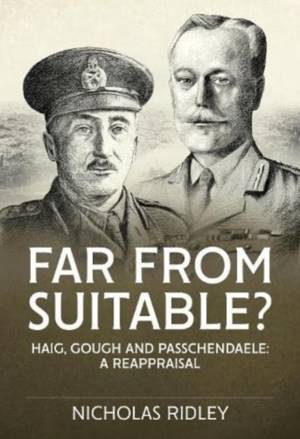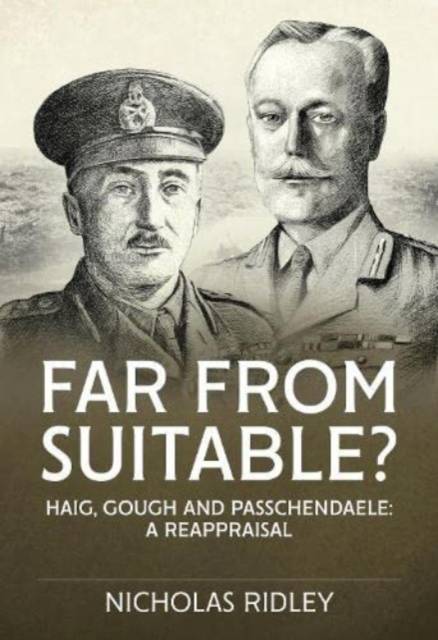
Bedankt voor het vertrouwen het afgelopen jaar! Om jou te bedanken bieden we GRATIS verzending (in België) aan op alles gedurende de hele maand januari.
- Afhalen na 1 uur in een winkel met voorraad
- In januari gratis thuislevering in België
- Ruim aanbod met 7 miljoen producten
Bedankt voor het vertrouwen het afgelopen jaar! Om jou te bedanken bieden we GRATIS verzending (in België) aan op alles gedurende de hele maand januari.
- Afhalen na 1 uur in een winkel met voorraad
- In januari gratis thuislevering in België
- Ruim aanbod met 7 miljoen producten
Zoeken
€ 41,95
+ 83 punten
Omschrijving
"Author Nicholas Ridley is a lawyer and writes like one, making carefully-constructed arguments with impressive logic... recommended for those with an interest in the high-level planning and operations of armies." -Over the Front
Passchendaele, also known as the Third Battle of Ypres, until in recent decades eclipsed by the Somme, stood as the representative image of First World War frightfulness and fruitless endeavor. Post-war memory of its myriad horrors arose from the dissemination of traumatic personal experience; the tradition of futility largely from the 1930s condemnation by military historian Basil Liddell Hart and, rather ironically, the Prime Minister who authorized it, David Lloyd George. The former wrote of it 'so fruitless in its results, so depressing in its direction was [it] that Passchendaele has come to be ... a synonym for military failure- a name black-bordered in the records of the British Army'.
The frightfulness has never been doubted. The first month, failing to achieve, or come near, the objectives set for the first day, and the last month, struggling to reach what was originally delineated as the first stage, took place in shocking conditions of rain and mud, sufficient to render difficult existence and movement, let alone fighting. Nor has the attempt by the Official Historian to claim the battle as largely successful engaged much traction or dented the impression of futility.
It is therefore unsurprising that historical writing on the subject gravitates toward the issue of responsibility: responsibility for fighting the battle at the time and in the place chosen, responsibility for the failure of the first month and responsibility for continuing the battle into November when it became clear that the original object of clearing the Belgian coast could not be achieved. Far From Suitable? Haig, Gough and Passchendaele: A Reappraisal is about responsibility for the failure of the first month and the relationship between the Commander-in-Chief, Sir Douglas Haig, and the man who bears the brunt of modern criticism, Sir Hubert Gough, the Commander of Fifth Army at Passchendaele.
Far From Suitable? is not a narrative history: it is a detailed examination of how and by whom the plans for the opening of the campaign were made; whether they were deficient, negligent or, as often alleged, reckless; and whether they caused needless loss. It further considers the conduct of the battle for the remainder of the first month's fighting, up to the point where the primary role in the battle was transferred to General Sir Herbert Plumer at the end of August 1917.
Far From Suitable? challenges the account given in the Official History, in an attempt fairly to consider what happened, and why.
Passchendaele, also known as the Third Battle of Ypres, until in recent decades eclipsed by the Somme, stood as the representative image of First World War frightfulness and fruitless endeavor. Post-war memory of its myriad horrors arose from the dissemination of traumatic personal experience; the tradition of futility largely from the 1930s condemnation by military historian Basil Liddell Hart and, rather ironically, the Prime Minister who authorized it, David Lloyd George. The former wrote of it 'so fruitless in its results, so depressing in its direction was [it] that Passchendaele has come to be ... a synonym for military failure- a name black-bordered in the records of the British Army'.
The frightfulness has never been doubted. The first month, failing to achieve, or come near, the objectives set for the first day, and the last month, struggling to reach what was originally delineated as the first stage, took place in shocking conditions of rain and mud, sufficient to render difficult existence and movement, let alone fighting. Nor has the attempt by the Official Historian to claim the battle as largely successful engaged much traction or dented the impression of futility.
It is therefore unsurprising that historical writing on the subject gravitates toward the issue of responsibility: responsibility for fighting the battle at the time and in the place chosen, responsibility for the failure of the first month and responsibility for continuing the battle into November when it became clear that the original object of clearing the Belgian coast could not be achieved. Far From Suitable? Haig, Gough and Passchendaele: A Reappraisal is about responsibility for the failure of the first month and the relationship between the Commander-in-Chief, Sir Douglas Haig, and the man who bears the brunt of modern criticism, Sir Hubert Gough, the Commander of Fifth Army at Passchendaele.
Far From Suitable? is not a narrative history: it is a detailed examination of how and by whom the plans for the opening of the campaign were made; whether they were deficient, negligent or, as often alleged, reckless; and whether they caused needless loss. It further considers the conduct of the battle for the remainder of the first month's fighting, up to the point where the primary role in the battle was transferred to General Sir Herbert Plumer at the end of August 1917.
Far From Suitable? challenges the account given in the Official History, in an attempt fairly to consider what happened, and why.
Specificaties
Betrokkenen
- Auteur(s):
- Uitgeverij:
Inhoud
- Aantal bladzijden:
- 314
- Taal:
- Engels
Eigenschappen
- Productcode (EAN):
- 9781915113658
- Verschijningsdatum:
- 30/04/2024
- Uitvoering:
- Paperback
- Formaat:
- Trade paperback (VS)
- Afmetingen:
- 168 mm x 242 mm
- Gewicht:
- 635 g

Alleen bij Standaard Boekhandel
+ 83 punten op je klantenkaart van Standaard Boekhandel
Beoordelingen
We publiceren alleen reviews die voldoen aan de voorwaarden voor reviews. Bekijk onze voorwaarden voor reviews.









